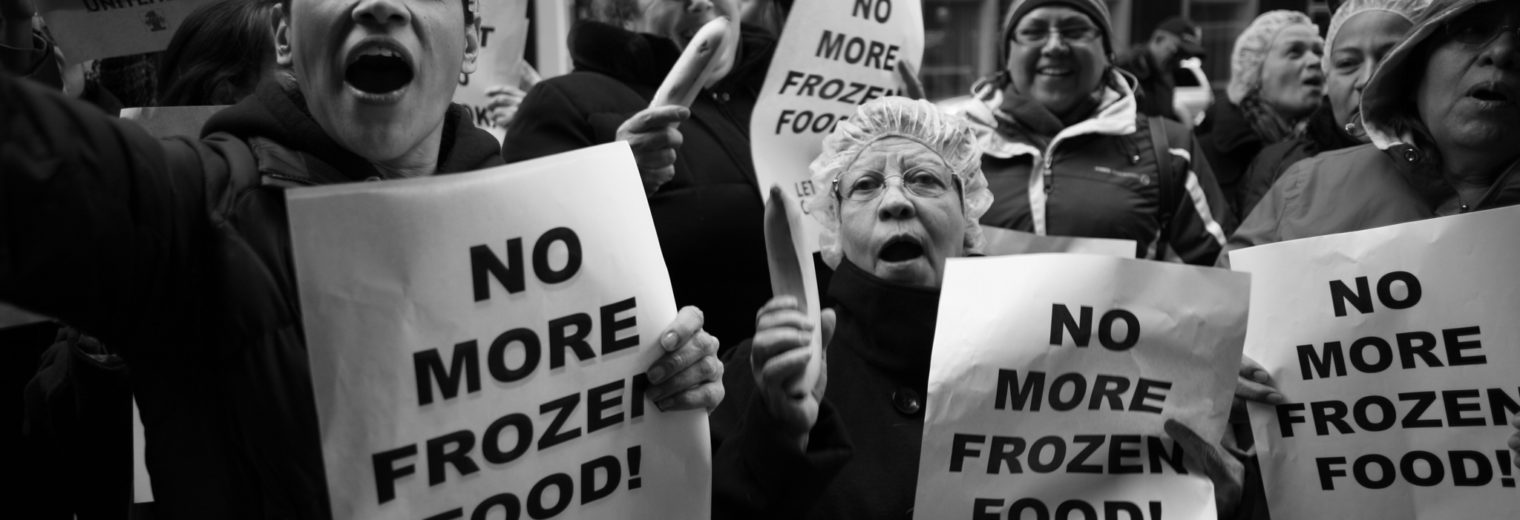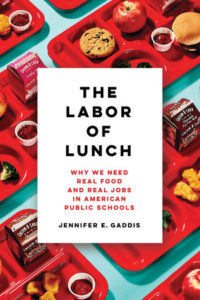Books
Real Food Reads Book Club
The Labor of Lunch: Why We Need Real Food and Real Jobs in American Public Schools
There’s a problem with school lunch in America. Big Food companies have largely replaced the nation’s school cooks by supplying cafeterias with cheap, precooked hamburger patties and chicken nuggets chock-full of industrial fillers. Yet it’s no secret that meals cooked from scratch with nutritious, locally sourced ingredients are better for children, workers, and the environment. So why not empower “lunch ladies” to do more than just unbox and reheat factory-made food? And why not organize together to make healthy, ethically sourced, free school lunches a reality for all children?
The Labor of Lunch aims to spark a progressive movement that will transform food in American schools, and with it the lives of thousands of low-paid cafeteria workers and the millions of children they feed. By providing a feminist history of the US National School Lunch Program, Jennifer E. Gaddis recasts the humble school lunch as an important and often overlooked form of public care. Through vivid narration and a dose of much needed imagination, The Labor of Lunch offers a stirring call to action and a blueprint for school lunch reforms capable of delivering a healthier, more equitable, caring, and sustainable future.
Check out the Labor of Lunch YouTube playlist!
Praise for The Labor of Lunch
“When we think about the crumbling national infrastructure that holds our country back, Jennifer Gaddis argues that we need to look beyond bridges, broadband, and high-speed rail—and see the urgency of bringing our nation’s 100,000 school cafeterias into the 21st century. She’s on exactly the right track. What if our nation’s largest restaurant chain—our 100,000 schools—could be retooled as an engine for creating good jobs in our communities, building our local farm economies, and nourishing our kids with fresh-cooked food?”
—Curt Ellis, Co-Founder & CEO, FoodCorps
“Argues that universally free, from-scratch lunches turns the school cafeteria into a vital community resource: one that helps kids develop healthy eating habits and provides skilled jobs for workers..”
— Tom Philpott, Mother Jones
“What might the history of school lunch teach today’s food justice activists about intersectionality? How did the private sector come to dominate what America’s youth eat? Why are most people readier to think of ‘lunch ladies’ as administrators of slop than as front-line care workers? Jennifer Gaddis’s swift prose and sharp mind keep you turning the pages through generations of women’s movement activism, lunch shaming, chicken nuggets, and a corps sacrificing their own welfare so that ‘their kids’ might eat well. The result is a brilliant history and incisive analysis of the cheap care that hides behind the modern school lunch.”
— Raj Patel
“A welcome addition to the growing library of works focusing on labor in the food system. This topic deserves attention and Gaddis is looking at the plight of an especially neglected group, the people who make and serve food to kids in schools. . . . Let grass-roots advocacy begin!”
— Marion Nestle
About the Author
 Jennifer Gaddis is assistant professor of Civil Society and Community Studies at the University of Wisconsin-Madison. She holds a PhD in social ecology from Yale University. Her research on public school-lunch programs and sustainable food systems has been supported by the US Department of Agriculture and the National Science Foundation. She brings a feminist perspective to food politics through her research on the social, political, and economic organization of public school lunch programs. Her book, The Labor of Lunch: Why We Need Real Food and Real Jobs in American Public Schools, is a work of activist scholarship that centers the perspectives of school lunch activists and frontline cafeteria workers who are fighting for food justice in communities across the United States. Her writing has appeared in numerous peer reviewed journals and popular publications including the Guardian, Washington Post, Teen Vogue, and New York Times.
Jennifer Gaddis is assistant professor of Civil Society and Community Studies at the University of Wisconsin-Madison. She holds a PhD in social ecology from Yale University. Her research on public school-lunch programs and sustainable food systems has been supported by the US Department of Agriculture and the National Science Foundation. She brings a feminist perspective to food politics through her research on the social, political, and economic organization of public school lunch programs. Her book, The Labor of Lunch: Why We Need Real Food and Real Jobs in American Public Schools, is a work of activist scholarship that centers the perspectives of school lunch activists and frontline cafeteria workers who are fighting for food justice in communities across the United States. Her writing has appeared in numerous peer reviewed journals and popular publications including the Guardian, Washington Post, Teen Vogue, and New York Times.
Her second book-length project draws on fieldwork in China, Brazil, Japan, South Korea, and Finland to examine how civil society activism, corporate interests, and national policy priorities shape the social justice and ecological goals of government-sponsored school lunch programs. By uncovering how, when, and to what extent school lunch programs operate as a site of resistance to the status quo—in terms of advancing food sovereignty, just labor practices, and ecological sustainability—this research will offer insight into just how pervasive the social expectation that school lunch, and care more broadly, should be “cheap,” and what can be done to shift the conversation to a more generative space from which to collectively reimagine the social organization of care through public institutions.
At UW-Madison, Dr. Gaddis is a faculty affiliate of the Center for Community and Nonprofit Studies, the Center for Cooperatives, the Center for Child and Family Well-being, and the Center for Integrated Agricultural Systems. She serves on the advisory boards for the Havens-Wright Center for Social Justice and the School for Workers and as the faculty advisor for Slow Food UW. She also co-leads two community-based research projects that involve graduate students in the Civil Society and Community Research PhD program. The first project in South Madison, Wisconsin, examines food justice and culinary agency among an inter-generational group of parents, children, and youth. The second project in Fort Peck, Montana, will enhance tribal food sovereignty on the reservation through community-driven infrastructure development in combination with oral histories of food sovereignty activists and digitally mapped trade networks sourced from across Turtle Island (North America).
Header image: UNITE HERE Local 1 workers gather in protest in April 2012 to demand an end to frozen airline-type lunches in Chicago public schools. Courtesy UNITE HERE.


 Jennifer
Jennifer 


